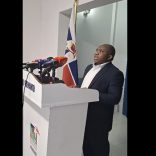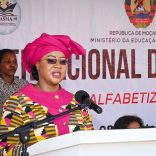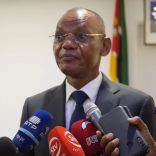Mozambique: Mondlane confirms party's approval, calls for celebration - Watch
Update: USSR-trained general in charge of Mozambican police

Folha de Maputo / General Júlio dos Santos Jane, seen here in a file photo
A career military man, General Julio dos Santos Jane, has replaced Jorge Khalau, who was dismissed on Wednesday as head of the Police of the Republic of Mozambique (PRM). He takes office barely 48 hours after another kidnapping taking place in Maputo outside the victim’s supermarket, located in one of the city’s prime areas, just across the road from the US Cultural Centre and a few buildings ahead of the Portuguese Consulate in Maputo.
Prior to his appointment, the new PRM General Commander was since 2011 Commander of the Mozambican Civic Service, a Ministry of Defence institution created by former president Armando Guebuza as an alternative for young Mozambicans who cannot perform military service.
Born in Manica province, Júlio dos Santos Jane did his military training in the former USSR, and holds a degree in Law. He is currently studying for a Masters degree in the same subject.
During the civil war he was commander of the Maputo City Garrison, a unit that was to ensure protection of the capital from the Renamo guerrillas and. according to AIM, Júlio dos Santos Jane has been credited with successfully preventing Renamo units from infiltrating Maputo.
Jane founded and was first director of the Samora Machel Military Academy in the northern city of Nampula. He was also deputy commander of the army
In 2013, Jane headed the government delegation of defence and security experts who, along with their Renamo counterparts, laid the groundwork for the meeting between then president Armando Guebuza and Renamo leader Afonso Dhlakama.
Jane replaces Jorge Henrique da Costa Khálau who was in office from December 17, 2008, who himself replaced Custodio Pinto, another career military officer, who held the post for about two years.
By law, the police of Mozambique ensures the observance of law and order, safeguarding the security of persons and property and public tranquility, the inviolability of state borders, respect for the democratic rule of law and the fundamental rights and freedoms of citizens. It is divided into five branches: Civil Protection Police, Traffic Police, Transport and Communications Police, Border Police and Special Forces and Reserve.
Among the challenges that the new General Commander is facing are the criminals who seem more organized than the police themselves, and the restructuring of the criminal investigation police, the subject of urgent consensus in Mozambique’s justice sector.
The president’s decision
This decision comes just days after the president said the capacity of the defence and security forces needed increasing, announcing recently at a police graduation ceremony that: “Only trained men, specialized and equipped with patriotic ethical and professional values, can give the best of themselves for the sake of a better future for all.”
On Tuesday, at the opening of the judicial year, President Nyusi referred to the urgency of restructuring the Criminal Investigation Police (PIC), a sub-structure of the PRM.
“The government, the justice sector and Parliament should join in seeking a solution to the PIC. The law goes through all these, hence they should speed up the process,” said the head of state, who the same day acknowledged there were indications of organized and international crime in Mozambique.
A controversial figure, Jorge Khalau was severely criticized in 2012 when the police refused to obey a court order to release agents involved in an arms seizure case. Khalau said that the police did not obey judges and had their own rules, generating outrage among opposition parties and human rights organizations.
Although Khalau has recently advocated a “cleansing of the ranks”, the Mozambican police have been negatively reported by international organizations for human rights violations including summary execution, arbitrary arrest, torture and excessive use of force.
The wave of abductions in Maputo involving police since 2011 and unsolved crimes like the 2015 murder of Franco-Mozambican constitutionalist lawyer and academic Gilles Cistac have also contributed to the deterioration of the police force’s image, along with minor corruption such as the extortion of bribes from motorists and reports of police weapons be rented out to criminals.
At the opening of the 2015 judicial year, Chairman of the Mozambican Bar Association Tomas Timbane warned that the police constituted “one of the weakest links” in the Mozambican state.
“The police do not exist to show service; they are there to serve us. We see the police detain citizens without any kind of proof, we see detainees with obvious signs of violence, arrested without warrant though not in flagrante delicto,” Timbane said in a hard-hitting speech to an audience which included Jorge Khalau.
“If we do not want the alternative to the rule of law to prevail, that is, that arbitrariness reigns, we urgently need to reform the police,” Timbane said.
The police have been back in the spotlight recently in the escalation of political violence in Mozambique, with the opposition Renamo (Mozambique National Resistance) reporting alleged attempts by defence and security forces to assassinate its leader, Afonso Dhlakama, in September and October 2015, and its secretary-general, Manuel Bissopo in January of this year.
Police rejected these claims at the time, but the cases remain unsolved.












Leave a Reply
Be the First to Comment!
You must be logged in to post a comment.
You must be logged in to post a comment.